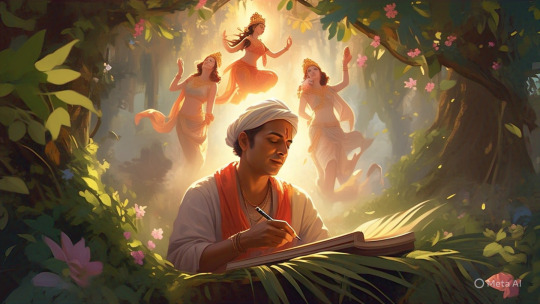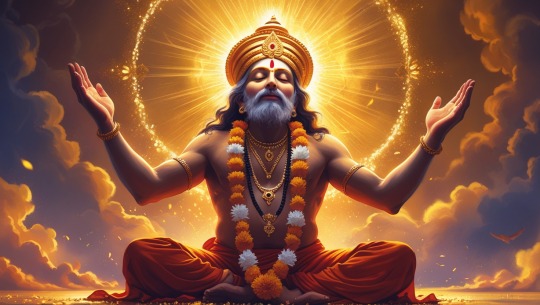#LoveBeyondLogic
Explore tagged Tumblr posts
Text
Experiencing Twin Flame Connections: A Journey of Love and Awakening
Last night was unlike anything I’ve ever experienced on this Twin Flame path. Right before I fell asleep, my heart suddenly started fluttering — uncontrollably. At first, I didn’t understand it. I had been consciously avoiding his posts, avoiding distractions, staying away from anything that pulls me emotionally. I was trying to be detached. But something shifted. A flood of love messages came…
#1111Awakening#AstralConnection#ChanneledMessages#DivineFeminine#DivineGuidance#DivineMasculineAwakening#DivineTiming#EmotionalHealing#EnergyShift#HeartAwakening#HigherSelfGuidance#KarmicHealing#LoveBeyondLogic#SacredLove#SoulConnection#SpiritualAwakening#SpiritualVisions#TwinFlameJourney#TwinFlameSigns#TwinFlameUnion
0 notes
Text
When Poetry Meets Divinity: Rupa Goswami’s Legacy

There are scriptures that command the mind. There are philosophies that challenge the intellect. But rarely do we find words that sing to the soul.
Rupa Goswami’s legacy is that rare melody—where poetry is not merely ornamental, but instrumental in revealing the deepest truths of divine love. His writings are not just literature; they are portals into rasika spirituality, drenched in bhakti and beyond logic.
To understand Rupa Goswami is to accept that the Divine doesn’t always shout from the mountaintop—it whispers through a verse, sighs through a metaphor, and dances in the pauses of a song.
Poetry as Bhakti Yoga
In Rupa Goswami's world, every syllable is sacred. His poetry isn't just written—it’s worshipped. Through verses in Stavamala, Ujjvala-nilamani, and Bhakti-rasamrita-sindhu, he stitched the heartbeats of Radha and Krishna into linguistic embroidery. His aim wasn’t to explain God. His aim was to dissolve the “I” that seeks explanation.
For Rupa, bhakti wasn’t a belief system—it was an aesthetic surrender. His verses didn't teach devotion—they caused devotion. Each composition was a mirror reflecting the soul’s longing to be absorbed into the divine rasa.
The Divergent Bridge: Language as Love
In a world where spirituality is often reduced to rigid rules and intellectual frameworks, Rupa Goswami shattered the divide between beauty and truth. He offered an incomparable bridge: poetry as prasad, meter as mantra, and metaphor as meeting point between jiva and Krishna.
He didn’t preach. He sang. He didn’t instruct. He invoked. He didn’t teach love. He translated it into rhythm.
His work is the quiet revolution where Sanskrit meters were tuned to the pitch of the heart’s yearning.
Why This Matters Today
Modern seekers often hunt for the Divine in silence, detachment, or philosophical detours. Rupa Goswami reminds us: God isn’t hiding behind complexity. Sometimes, He dances openly in couplets.
In a noisy world, his poetry offers sacred stillness. In a heart full of doubt, his metaphors offer melted answers. And in an age of spiritual fatigue, he reawakens the sheer joy of feeling God.
The Devotional Toolkit: Living Rupa’s Rasika Rasa
Here’s how to let his poetic bhakti infuse your daily life:
🌼 Daily Rasika Verse Start your day by reading one verse from Stavamala or Bhakti-rasamrita-sindhu. Don’t analyze—immerse. Read it aloud. Let the sounds touch your breath.
🪕 Metaphor Meditation Take one metaphor from Rupa’s work (e.g., “Krishna’s smile is a moon rising in the ocean of Radha’s heart”) and meditate on it for 5 minutes. Visualize it. Feel it emotionally.
🖋️ Devotion Doodles Write a four-line verse each morning dedicated to your own experience of divinity. Don’t worry about rhyme or rules—just let your bhakti bleed through your ink.
🎵 Chant with Cadence Choose a shloka of Rupa and sing it like a lullaby. No perfection needed. Let the vibration echo within your body temple.
🌸 Poetry Altar Create a small sacred space with your favourite verses, images of Radha-Krishna, and offerings. This becomes a “poetic portal” to reconnect when the day feels mundane.
Rupa Goswami didn’t just write poetry. He handed us the flute. And whispered, “Now sing your soul into the heart of God.”
#RupaGoswami#BhaktiPoetry#DivineLove#SpiritualAwakening#KrishnaConsciousness#SacredPoetry#VaishnavSaints#InnerDevotion#MysticVerses#RadhaKrishnaPrem#BhaktiMovement#SpiritualHeritage#VedicWisdom#DevotionalArt#LoveBeyondLogic
0 notes
Text
The Play of Divine Love: Rasas as Tools for Inner Growth

When Rupa Goswami spoke of Rasas, he wasn’t referring to taste buds or surface-level emotions. He unveiled a secret architecture of the soul — a language of divine moods that can reshape human consciousness. Rasas, the essence-flavors of love, are not earthly emotions dressed up for spiritual poetry. They are the inner rivers that flow directly into the ocean of the Divine.
The world teaches us to numb, to control, to master emotion. But Rupa Goswami urged the opposite — experience, express, expand. The path of Bhakti is not about renouncing the world but refining your relationship with it, by tuning into these Rasas: Shanta (peace), Dasya (servitude), Sakhya (friendship), Vatsalya (parental love), Madhurya (romantic love). Each rasa is a mirror, helping you recognize the state of your spiritual heart.
Imagine the Rasas as sacred dance partners. Some days, your soul waltzes in calmness (Shanta). Other days, you bow to the Divine as an eager servant (Dasya). On rare golden mornings, the Divine is your childhood friend (Sakhya). At times, you cradle God as your own child (Vatsalya). And ultimately, you dissolve into the deepest intimacy — a love where logic no longer survives (Madhurya).
This emotional architecture isn’t abstract philosophy. It’s the exact design of the Universe. Rupa Goswami taught that engaging with these Rasas consciously can elevate mundane living into a transcendent love affair. He didn’t ask for perfection — only sincerity. When you align your inner emotional world with these Rasas, you aren’t escaping reality — you’re transcending it.
Divergent Insight: Most spiritual paths emphasize self-control, detachment, or stillness. Rupa Goswami's path is about playfulness with purpose. The Divine doesn’t want emotionless surrender; the Divine desires your whole heart, flavored and overflowing. Rasas aren’t distractions; they are your toolkit for transcendence. Feeling deeply is not a weakness but the engine of divine connection.
Practical Toolkit: Experiencing Rasas Daily
Morning Rasa Meditation: Before sunrise, choose one Rasa for the day. Visualize yourself living in that emotional space with the Divine — be it peace, friendship, servitude, parental love, or romance. This sets the emotional frequency of your day.
Sacred Journaling: Each night, write how your chosen Rasa shaped your thoughts, actions, and feelings. Note any emotional resistance. This practice reveals unconscious barriers to divine intimacy.
Bhakti Ras Dance: Select a bhajan or kirtan that invokes your chosen Rasa and allow your body to move naturally. Physical expression dissolves ego faster than intellectual understanding.
Micro-Rasa Practices: During mundane activities — eating, walking, working — pause and mentally offer the moment in your chosen Rasa. For example, fold laundry as an offering of Dasya (service), or sip tea as if sharing it with the Divine (Sakhya).
Weekly Rasas Swap: Rotate the Rasas weekly. Experiencing all five Rasas over time creates emotional elasticity, broadens your spiritual maturity, and awakens compassion beyond identity.
Rupa Goswami’s Rasas are not antique poetic metaphors. They are the original software code of human longing, rewritten in the script of divine affection. If you can master these flavors, life itself becomes a celebration of unbroken connection with the Divine — raw, real, and beautifully illogical.
#RupaGoswami#BhaktiYoga#DivineLove#RasasExplained#SpiritualGrowth#InnerTransformation#VedicWisdom#LoveBeyondLogic#BhaktiPath#SoulAwakening#MysticIndia#ConsciousLiving#EmotionalAlchemy#RasaTheory#DailyDevotion
0 notes
Text
How Love Transcends Logic: The Bhakti Revolution of Rupa Goswami

In a world obsessed with logic, reason, and calculation, love remains the one force that defies all boundaries. It breaks rules, rewrites destinies, and transforms the seeker into the sought. Rupa Goswami, the revolutionary saint of Bhakti, did not just preach devotion—he redefined the very way we experience the Divine. His teachings shattered the cold intellectualism of ritualistic religion and replaced it with something far more powerful: an uncontainable, ecstatic love that transcends logic.
Bhakti, according to Rupa Goswami, is not a transaction. It is not a ladder to climb, nor a doctrine to memorize. It is a fire that consumes the ego, a current that sweeps the heart beyond reason into the realm of divine madness. This is not love as the world understands it; it is love that laughs at logic, dances in surrender, and dares to reach for the infinite.
The Bhakti Revolution: Beyond Mind, Into the Heart
Before Rupa Goswami, devotion was often seen as a means to an end—whether it was liberation (moksha), blessings, or a better life. But he introduced a radical shift: Bhakti as the goal, not just the path. He declared that the highest spiritual state was not one of knowledge, renunciation, or even discipline, but of rasa—the sweet, intimate experience of divine love.
His Bhakti revolution was about dissolving the mind into the heart. He taught that the logical mind will always seek control, but true love thrives in surrender. Just as a river does not argue with the ocean but rushes to merge with it, so too must the devotee lose themselves in the vastness of divine love.
Why Love Wins Over Logic
Logic demands proof. Love creates miracles. Bhakti does not ask, “Does God exist?” It says, “I love, therefore I am.”
Logic calculates. Love surrenders. The mind seeks safety; Bhakti leaps into the unknown.
Logic separates. Love unites. Intellectualism can create distances; Bhakti dissolves them.
Logic questions. Love experiences. Devotion is not about debating God’s nature; it is about dancing with the Divine.
Practical Toolkit: Living Rupa Goswami’s Bhakti Revolution
This is not philosophy to be admired from a distance; it is a living fire waiting to consume you. Here’s how you can incorporate it into your daily life:
1. Shift from Thinking to Feeling
Instead of analyzing life, experience it.
Find moments in the day to just be—feel the wind, listen to a bird, or sit in silence.
2. Surrender One Thought a Day
Each day, take one anxious, controlling thought and release it to the Divine.
Say, “This is not mine to hold. I trust love over logic.”
3. Cultivate Spontaneous Devotion
Sing without reason, dance without structure, love without expectation.
Devotion should not be a scheduled practice; it should be a wild, overflowing river.
4. See the Divine in the Unexpected
Rupa Goswami saw Bhakti in everything. Try looking at the world through those eyes.
Find the sacred in the mundane: your morning coffee, the laughter of a stranger, the silence of the night.
5. Let Go of the ‘Why’ and Embrace the ‘Wow’
Stop asking, “Why should I love?” and simply love.
Shift from questioning life to celebrating it.
Dare to Love Beyond Logic
Rupa Goswami’s Bhakti is not for the timid. It is for those who are ready to love with wild abandon, to let their hearts lead where their minds hesitate.
This is not a path of safety; it is a path of surrender. This is not a journey of knowing; it is a journey of feeling. This is not devotion as a duty; it is devotion as destiny.
Logic will always ask why?—but love simply is. Will you take the leap?
#RupaGoswami#BhaktiRevolution#LoveBeyondLogic#SpiritualAwakening#DivineLove#BhaktiYoga#Transcendence#HeartOverMind#EcstaticDevotion#SurrenderToLove#SoulfulJourney#TimelessWisdom#SacredConnection#LiveWithBhakti#InnerBliss
0 notes